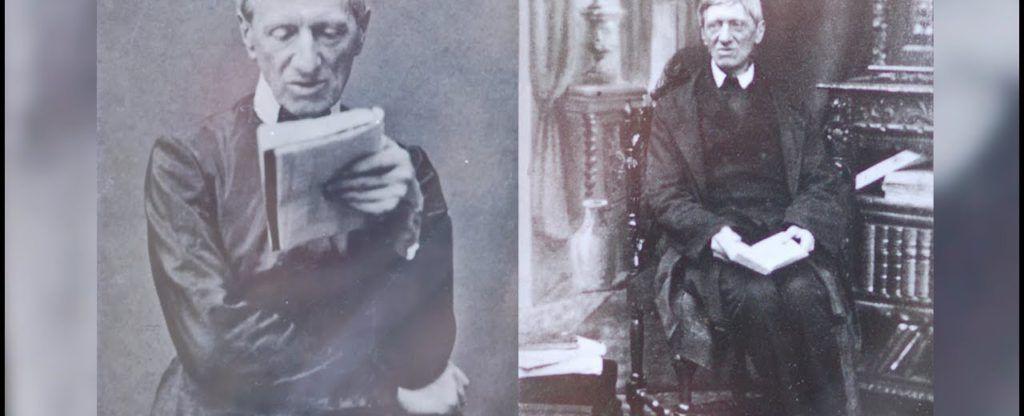Saints are Sometimes Literary Men: A Reflection on the Announcement of Newman's Canonization

The news finally arrived today. Ever since it was announced in February that Newman would be canonized, we've been waiting eagerly to learn the details of when and how the ceremony would take place. Now we know: Pope Francis will officially declare Newman a saint at a Mass in Rome on the morning of October 13th. This date is appropriate, because it will be just four days removed from the date that Newman was received into the Church (October 9th), which happens to fall on a Wednesday this year.
It's only natural when a canonization takes place to laud the heroic virtues of the person being sainted, but as I mentioned in a previous blog post, these occasions are ultimately opportunities for the people of God to reflect on the power of divine grace. It's not as if the saints have special abilities that the rest of us lack or that they somehow put forth more effort. Rather, the saints are those who opened themselves completely to God's grace. They set aside their own will, so that God's will could be accomplished in and through them. To borrow an image that I once heard from a teacher of mine, the saints' lives are like the burning fingers of God reaching down to touch the earth.
Newman himself never expected to be considered a saint. In fact, he was downright resistant to the idea. When a certain Miss Munro communicated to Newman that she and a friend looked to him as a living saint, he bluntly dismissed the idea, writing back, "I have nothing of a Saint about me as every one knows … Saints are not literary men, they do not love the classics, they do not write Tales. I may be well enough in my way, but it is not the 'high line'" (LD XIII:419). Newman added in the same letter that it would be sufficient for him "to [polish] the saints' shoes—if St. Philip [Neri] uses blacking, in heaven" (ibid.).
Of course, such humility is precisely what one would expect from a truly holy person, and in this case the Church is justified in disagreeing with Newman's self-analysis. Ironically, one of the main points that Newman counted against himself—that he was a literary man—actually ended up being a central feature of his life's witness. In a particularly profound way, Newman showed how the intellectual life, when rooted in prayer, can be a means of drawing others into a transformative encounter with God. Newman's writings are infused with the power of the Holy Spirit, and thus have served as the spark for numerous conversions, both during his lifetime and in the decades following his death.
The fact that Newman's sanctity took on a different form than what we see in the lives of holy monks, like St. Anthony, or in the lives of saints who daily served the poor, like St. Vincent de Paul, makes it no less worthy of imitation. The variety that we witness in the lives of the saints is a testament to God's creativity in how he goes about gifting human beings with the divine life. As Newman observed, "Very various are the Saints, their very variety is a token of God's workmanship" (Discourses to Mixed Congregations, 101). To speak colloquially, saints come in many shapes and sizes, yet they are united in this one way: they point beyond themselves to Christ. The life of a saint, one could say, is like an ornate crystal that takes the light of Christ and refracts it to create a new and beautiful display of God's love in the world. Our attention, then, is not supposed to stop at the saint, but is always to go beyond that person to reach a deeper recognition of Christ and his love for us. As Newman put it, the saints "are raised up to be monuments and lessons, they remind us of God, they introduce us into the unseen world, they teach us what Christ loves, they track out for us the way which leads heavenward" (ibid., 102; emphasis mine).
So if you have been moved by Newman's witness, and are looking for a way to commemorate the exciting news of his canonization, there would be no more appropriate step than to deepen your faith in Christ, seeking daily the grace to become more like him. And this makes total sense, for within the economy of the kingdom, the members of the Church—both those in heaven and those on earth—exist in a non-competitive relationship with the God who has adopted them into his family. God's glory, in other words, isn't diminished by being bestowed upon humans; it's magnified. And the true saints are those who through their teaching and example inspire others to conform more closely to the image of God's Son. Another way of saying this is that by imitating the saints, we become more like Christ. Thus, Saint Paul could justly instruct the believers at Corinth, "Imitate me, just as I also imitate Christ" (1 Cor. 1:11). As far as I know, Newman never wrote something similar, but the same principle holds. In honor of his impending canonization, then, I'd like to admonish you: Be imitators of Newman, just as he imitated Christ.
Share
Ryan Marr
Associate Provost at Mercy College of Health Sciences, Iowa
Ryan ("Bud") Marr Associate Provost at Mercy College of Health Sciences. He has served as the Director of NINS and Associate Editor of the Newman Studies Journal from 2017-2020. He is the author of To Be Perfect Is to Have Changed Often: The Development of John Henry Newman's Ecclesiological Outlook, 1845–1877 (Rowman & Littlefield, 2018), and has also contributed essays to Newman and Life in the Spirit (Fortress Press, 2014), Learning from All the Faithful (Pickwick, 2016), and The Oxford Handbook of John Henry Newman (Oxford University Press, 2018). His research interests include the life and writings of John Henry Newman, ecclesiology, and the reception of Vatican II.
Topics
Newsletter
QUICK LINKS

